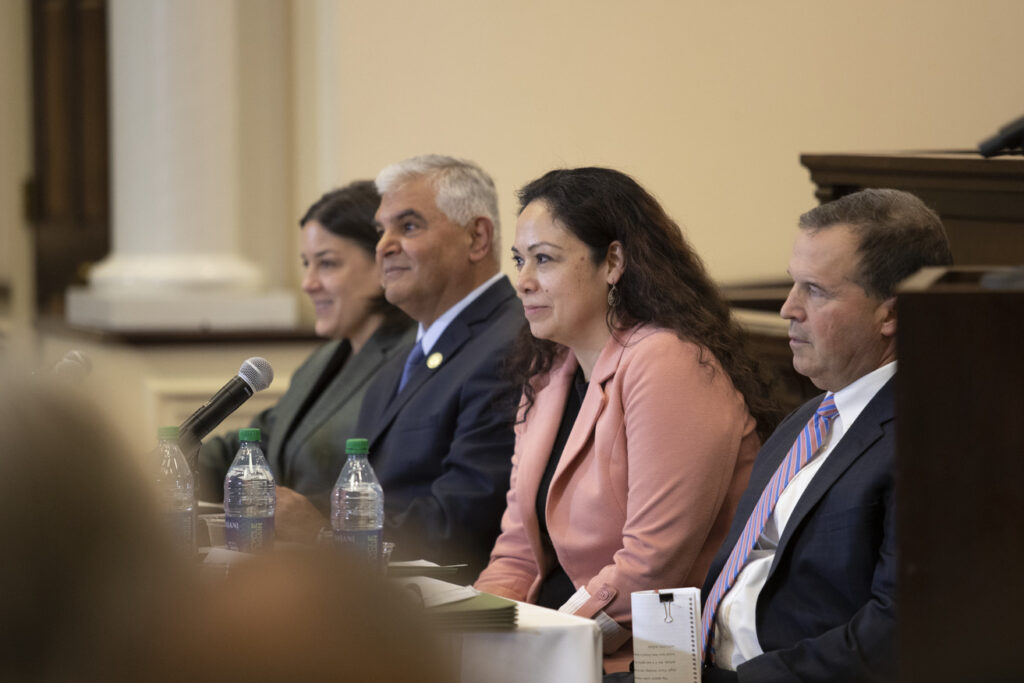From L to R: Jacqueline C. Romero, Chief Judge Juan R. Sánchez, Diana Cortes, and Judge L. Felipe Restrepo
Temple Law School celebrated a trailblazing gift and the alumnus behind it with a powerful discussion of Latinx representation in the profession and a joyful reception afterwards. The Hon. Nelson A. Díaz Professorship in Law, currently held by the Director of Temple’s Center for Tax Policy and Practice Alice G. Abreu, is the first Latinx endowed professorship at Temple University and believed to be the first in the state of Pennsylvania. It is named for the Hon. Nelson A. Díaz ’72, who as a law student co-founded Temple’s BLSA chapter before embarking on a career of firsts, which included becoming the first Latino judge in Pennsylvania.
Just a few decades after Judge Díaz’s historic election to the Court of Common Pleas in 1981, four of the most powerful legal jobs in Philadelphia are held by Latinx lawyers and judges: City Solicitor, held by Diana Cortes; judge on the Court of Appeals for the Third Circuit, held by the Hon. L. Felipe Restrepo; US Attorney for the Eastern District of PA, held by Jacqueline Romero; and Chief Judge of the US District Court for the Eastern District of PA, held by the Hon. Juan Sánchez. In what Dean Rachel Rebouché called a “full circle moment,” Temple Law School brought them together for a panel discussion on Latinx representation in the legal profession.
Dean Rebouché centered her remarks on the panelists’ current roles and the scale of their impact. Two of them “lead what are arguably the largest and most powerful public sector legal organizations in the region: Diana Cortes as the City Solicitor, Philadelphia’s chief legal officer, who leads more than 215 lawyers in the city’s Law Department; and Jacqueline Romero, the US Attorney for the Eastern District of Pennsylvania, whose office serves more than five million people across nine counties – one of the most populous districts in the nation,” she said. “Joining them,” she continued, “are two Latino federal judges. The Honorable Juan Sánchez is Chief Judge of the US District Court for the Eastern District of Pennsylvania – the first Latino Chief in its 229-year history. Our moderator, the Honorable L. Felipe Restrepo, sits on the US Court of Appeals for the Third Circuit and serves as Vice-Chair of the United States Sentencing Commission. Their achievements, collectively and individually, are groundbreaking, and it is a profound honor that they have joined us here today.”
The panel opened their discussion by sharing observations about how their Latinx heritage and upbringing shaped who they have become as lawyers and leaders, and the importance of Latinx representation in the legal profession today. Solicitor Cortes, noting that her Latina heritage is “filled with resilience, entrepreneurship, grit, and hard work,” credited this perspective with her commitment to empowering and encouraging those all who work with (“not,” she emphasized, “for”) her before describing racial justice as “part of the fabric of the work of the city.” Judge Sánchez, for whom Cortes clerked, talked about how participation in the Aspira program as a youth motivated him to get a good education and then return to the community to contribute. As the first Latino outside of Philadelphia to become a state judge in PA, Sánchez reflected on the importance of mentorship and the need to “lift the generation that comes behind us. Don’t see them as threats to our existence – we have to cultivate the next generation of leaders so they can take our place.” US Attorney Romero, whose grandfather immigrated to the US alone at 16 and eventually established a family diner, said that the values she learned there are what she brings to the US Attorney’s office today, remarking “my love of public service came from the kitchen of that diner. Whether it was a free cup of coffee for someone who needed it or job training for people who had just arrived in the United States, public service was a way of life.” Romero, like both Cortes and Sánchez, also cited racial justice as integral to the work of her office. “We
are constantly vigilant – who are we looking after, who are we going after, are we doing it in a way that we would call constitutional policing? The charges that we choose, the plea agreements we offer, the sentences we advocate for with our judges all have to be from a place of equity, including racial equity.”
The panel then turned to five cases with Latinx connections that influenced the civil rights landscape in education, voting rights, election law, and jury selection:
- Education: School Desegregation – Mendez v. Westminster (1946) (California);
- Bilingual Education – Aspira v. New York Board of Education (1972) (New York);
- Voting Rights: Bilingual Elections – López v. Dinkins (1973) (New York);
- Bilingual Elections – Arroyo v. Tucker (1974) (Philadelphia); and
- Jury Selection: Exclusion of Latino Juries – Hernandez v. Texas (1954) (Texas).
After the panel concluded, Judge Díaz offered remarks about significant moments in his career and his desire for the Díaz Professorship to shine a spotlight on Latinx contributions to civil rights, racial justice, and the legal profession.
About the Díaz Professorship in Law
The Hon. Nelson A. Díaz Professorship in Law provides financial support to a distinguished member of the Law School’s faculty and annual educational programming to highlight Latinx civil rights contributions, legal issues, and current viewpoints. It is currently held by Professor Alice G. Abreu.

